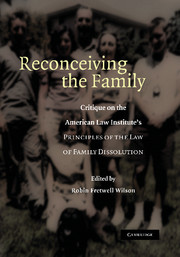 Reconceiving the Family
Reconceiving the Family Book contents
- Frontmatter
- Contents
- Acknowledgments
- Foreword, by Mary Ann Glendon
- List of Contributors
- Introduction
- PART ONE FAULT
- PART TWO CUSTODY
- PART THREE CHILD SUPPORT
- PART FOUR PROPERTY DIVISION
- PART FIVE SPOUSAL SUPPORT
- PART SIX DOMESTIC PARTNERSHIP
- PART SEVEN AGREEMENTS
- PART EIGHT JUDICIAL AND LEGISLATIVE PERSPECTIVES
- PART NINE INTERNATIONAL REFLECTIONS
- 23 Empowerment and Responsibility: The Balance Sheet Approach in the PRINCIPLES and English Law
- 24 The Past Caretaking Standard in Comparative Perspective
- 25 Compensating Gain and Loss in Marriage: A Scandinavian Comment on the ALI PRINCIPLES
- Afterword: Elite Principles: The ALI Proposals and the Politics of Law Reform, by Carl E. Schneider
- Index
23 - Empowerment and Responsibility: The Balance Sheet Approach in the PRINCIPLES and English Law
Published online by Cambridge University Press: 25 January 2010
- Frontmatter
- Contents
- Acknowledgments
- Foreword, by Mary Ann Glendon
- List of Contributors
- Introduction
- PART ONE FAULT
- PART TWO CUSTODY
- PART THREE CHILD SUPPORT
- PART FOUR PROPERTY DIVISION
- PART FIVE SPOUSAL SUPPORT
- PART SIX DOMESTIC PARTNERSHIP
- PART SEVEN AGREEMENTS
- PART EIGHT JUDICIAL AND LEGISLATIVE PERSPECTIVES
- PART NINE INTERNATIONAL REFLECTIONS
- 23 Empowerment and Responsibility: The Balance Sheet Approach in the PRINCIPLES and English Law
- 24 The Past Caretaking Standard in Comparative Perspective
- 25 Compensating Gain and Loss in Marriage: A Scandinavian Comment on the ALI PRINCIPLES
- Afterword: Elite Principles: The ALI Proposals and the Politics of Law Reform, by Carl E. Schneider
- Index
Summary
During the last quarter of the twentieth century, the long “welfarist” era stretching from the Enlightenment seemed to be being displaced by a dual-track strategy proclaiming the promotion of individual empowerment and responsibility. The drive for empowerment is seen in the increasing significance of the discourse of rights, which has undermined, or at least destabilized, the institutions through which welfarism operated. This destabilization in turn set up a new problem of the legitimacy upon which the rights-claims and related responsibilities were grounded, for if institutions, such as marriage or parenthood, lose their authority as sources for rights and obligations, it is necessary to find an alternative basis for their binding force. This chapter assesses how far the Principles and some recent developments in English family law fit in with this picture, and, if they do, how they seek to resolve the problem of legitimacy, that is, the source of authority for such rights and obligations. This chapter concludes that they do broadly fit the picture. The approach to the legitimacy problem is hard to characterize. This chapter suggests that the Principles seem to approach the question of legitimacy through a method which, for want of a better term, this chapter calls the “balance sheet” approach. This chapter also offers a view about this method.
Compensatory Spousal Payments and Division of Property
This part examines the ALI approach to alimony and property division and contrasts it with the approach taken in England and Wales.
- Type
- Chapter
- Information
- Reconceiving the FamilyCritique on the American Law Institute's Principles of the Law of Family Dissolution, pp. 433 - 445Publisher: Cambridge University PressPrint publication year: 2006
